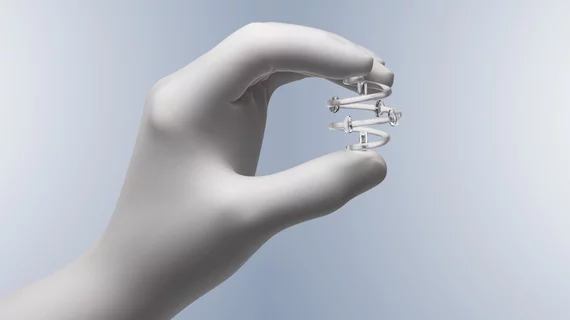Hologic recalling breast care devices after 71 injuries, FDA says
Hologic is recalling certain breast care devices after 71 reported patient injuries, according to an alert issued by the U.S. Food and Drug Administration Wednesday. This is a Class I recall, the most serious designation from the FDA, with use of these devices potentially causing “serious injuries or death.”
The alert pertains to the BioZorb and BioZorb LP radiographic markers, implanted in soft tissue to indicate the site for radiation therapy or other medical procedures. In recent months, the FDA has received reports of adverse events including discomfort from feeling the marker in the breast, infection, pain, rash, fluid buildup and other complications. There also is danger the devices could break through the skin of the nipple, move out of place, or fail to resorb in a patient’s body.
The FDA previously issued a warning about the devices in February, with the response now shifting to a recall, which the agency identified as a “correction, not a product removal.”
“The potential consequences of the device moving out of position from where it was implanted (migration) and breaking through the chest cavity and/or blood vessels are severe and potentially life-threatening should it occur,” the FDA said in February. “Migration of the device may also impact future targeting of radiation to the intended site.”
BioZorb is FDA cleared for the radiographic marking of soft tissue sites including the breast. It also is used to tag sites for future medical procedures, the FDA noted. However, the product is not approved for filling space in breast tissue or improving cosmetic outcomes after procedures. The recall pertains to 53,492 devices in the U.S., distributed between April 29, 2019, and April 1, 2024.
The agency is urging radiologists and radiation oncologists to monitor patients who have an implanted BioZorb marker for any signs of complications. Physicians also should discuss the potential risks of such tissue-marking devices, inform patients about their implantation, and report any problems to the federal government. Patients, meanwhile, should contact their healthcare provider and report any problems or complications to Hologic at breasthealth.support@hologic.com and to the FDA’s MedWatch Adverse Event Reporting program.
Hologic issued a brief statement after the FDA announced the recall.
"Hologic and the FDA issued a safety notification in February to help ensure patients and healthcare providers had the most up-to-date information regarding BioZorb," a company spokesperson said May 23. "The recent administrative classification of the safety notification posted on the FDA’s website was an expected step in the regulatory process. BioZorb continues to be offered and used safely and successfully with patients undergoing radiation treatment following breast conserving surgery. Patient safety is, and has always been, our top priority."
Hologic revealed further details about the circumstances leading up to the recall in a May 3 filing with the Securities and Exchange Commission. On Nov. 4, 2022, a group of plaintiffs filed a product liability complaint in Massachusetts state court. Patients claim they experienced side effects that were not disclosed in the BioZorb marker’s instructions for use, with similar lawsuits following afterward.
Thus far, attorneys have filed complaints on behalf of 88 different plaintiffs, according to the filing.
“Discovery is ongoing,” Hologic wrote May 3. “While the Company believes it has valid defenses and plans to vigorously defend its position, litigation can be costly and unpredictable, and at this early stage the company cannot reasonably assess the outcome of this matter.”
BioZorb became part of the Hologic product line after the company acquired Focal Therapeutics for $125 million in 2018. In the same SEC filing, Hologic said it recorded a nearly $27 million impairment charge on its balance sheet in the second quarter of 2024 because the BioZorb group of products is worth less than it was previously valued at during the original transaction.
Model numbers impacted by the recall, which was initiated March 13, include:
- F0405 BioZorb Marker 4cm x 5cm
- F0404 BioZorb Marker 4cm x 4cm
- F0331 BioZorb Marker 1cm x 3cm x 3cm
- F0231 BioZorb Marker 1cm x 3cm x 2cm
- F0221 BioZorb Marker 1cm x 3cm x 2cm
- F0304 BioZorb Marker 3cm x 4cm
- F0303 BioZorb Marker 3cm x 3cm
- F0203 BioZorb Marker 2cm x 3cm
- F0202 BioZorb Marker 2cm x 2cm
Editor's Note: This story has been updated to include a statement from Hologic.

